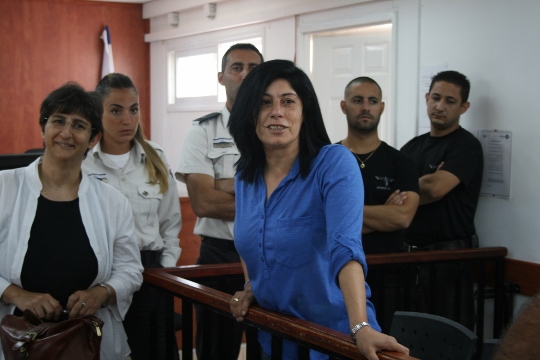Those trying to delegitimize rights groups because their funds come from overseas are sending a very clear message: human and civil rights are not values that exist naturally in Israel.

Left-leaning Israelis have for decades warned that the occupation will one day come home to roost — that the injustices visited upon Palestinians in the territories will eventually undermine the democratic fabric of Israel itself.
Such warnings are problematic, since they suggest that military occupation is somehow acceptable as long as it isn’t detrimental to the occupier. But at the end of the day warnings that “occupation corrupts” ring true, and two events this week illustrate just how ugly a prophesy it is.
Israel’s Supreme Court this week authorized the denial of legal counsel to the main suspects in the haunting murder of the Dawabshe family. That, on top of a revelation that the Shin Bet, with authorization from the attorney general, has been using “extraordinary” means of interrogation, or as it’s called by everybody else — torture.
The use of torture and the denial of basic rights is not anything new for Israeli security services. Just a couple of months ago the Shin Bet was forced to admit that it illegally used torture against possibly dozens of Palestinians it rounded up a year ago. As demonstrated by the case of feminist Palestinian lawmaker Khalida Jarrar, the state often prefers to put Palestinians in administrative detention instead of building a legal case for their imprisonment.

Those violations of basic civil and human rights, like the ability to effectively defend yourself in court and not having your body and dignity violated by torture, are now transcending Israel’s ethno-religious divide. And these abuses enjoy the support not only of the Israeli government, but also the majority of the opposition parties.
Terrorism is terrorism is terrorism, politicians from across the political map declared after the Duma murders, the most horrifying case of “Jewish terrorism” in recent years. Israel must treat Jewish terrorists “exactly like their brothers – Islamist terrorists,” opposition leader Isaac Herzog declared at the time, trying to out-flank the Right from the right.
That attitude, unfortunately, amounts to an assault on civil rights in the name of equality.
The second episode that is casting an increasingly ominous cloud over the values and protections of civil rights is the ongoing campaign being waged against organizations working to advance them. That offensive reached new heights this week when a right-wing organization affiliated with senior members of the Israeli government accused human rights organizations, and individual activists, of being foreign agents serving the nefarious agendas of hostile governments.
The message, similar to that made in an equally outrageous and anti-Semitic video published earlier this year, is clear: human rights and civil rights are not values that exist organically in Israeli society. Human rights and opposition to the occupation are being imposed from the outside-in, and only for the purposes of harming the Jewish state, its citizens and its global image, organizations like Im Tirzu, NGO Monitor and others suggest.
That worldview leaves no room for the idea that Israelis of conscience might, without any financial incentive, be troubled by dual legal systems for different classes of citizens and subjects largely based on ethnic and religious criteria. It leaves no room the idea that Israelis, motivated by the most universal liberal values, might want to form organizations that oppose their own government’s use of torture — against anybody. It does not allow for the idea that Israel’s own native sons, its combat soldiers whom it sends to do its tidings in the occupied territories, might have pangs of conscience and feel the need to talk about what they did for their country.
In short, those who accuse human rights organizations of being foreign agents are saying that human rights are not an Israeli value.
And while the current campaign of incitement against the Israeli Left, and particularly against human rights organizations, is being waged by organizations that represent a minority of Israelis, the wave of popular support they are riding on is far more mainstream. Initiatives targeting human rights NGOs — or “left-wing NGOs” as they’re referred to these days — have been led and co-sponsored by everyone from the Labor party to the ruling Likud to former foreign minister Avigdor Liberman. From the political center, not the fringes.
The attacks are also coming from more and more directions. In particular, Breaking the Silence, an organization of former Israeli soldiers who oppose the occupation, has been targeted in recent weeks by the country’s national police department, the defense minister, the education minister, and even the president himself. Critics of the organization rarely engage with Breaking the Silence’s messaging and activities, however. Instead the attacks tend to be ad hominem, focusing on where they fundraise and to whom they speak.
The persecution in Israel of human and civil rights NGOs — and the values they represent — is most certainly worrying, but it is not surprising. Similar trends have been documented around the world, often with much more ferocity. And it should not surprise anybody that a country that for five decades has justified the systemic violation of civil and human rights of one population would shy away from defending those very values against waves of populism, especially in the face of looming international isolation.
This story is not new, and yet it is only beginning. It used to be that Jewish privilege offered Israeli human rights activists some level of immunity from political persecution, the likes of which Palestinians have suffered for decades. With the current right-wing government’s strong hold on power, no discernible opposition in sight, and nobody even discussing ending the occupation, it is safe to say that the worst is yet to come.


